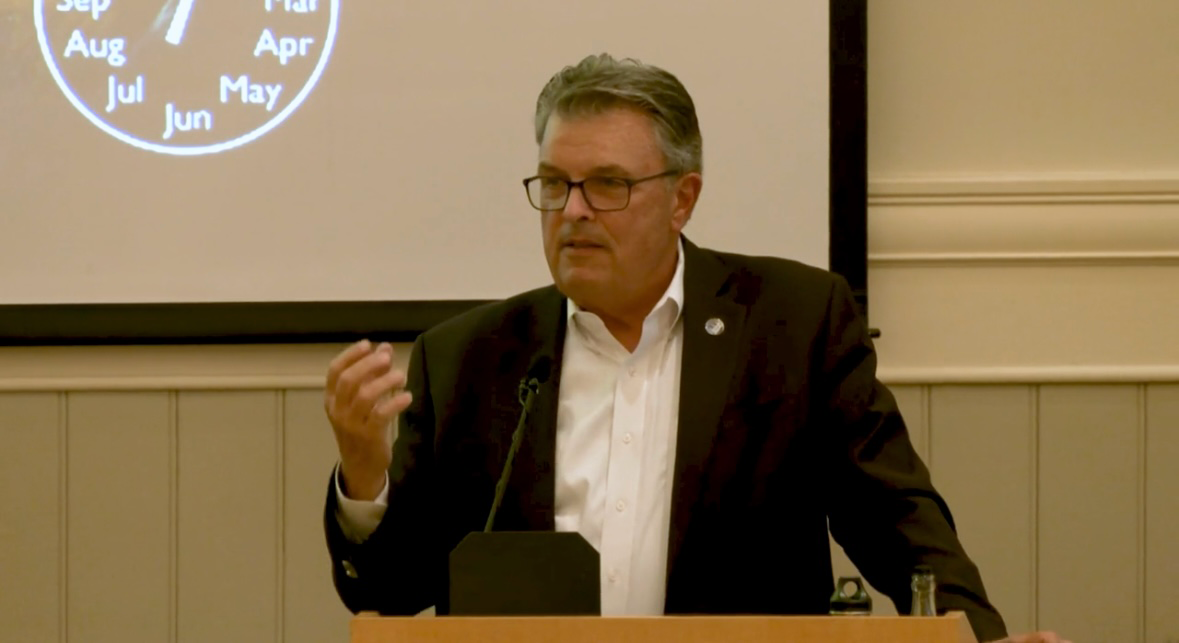Thursday, April 24
Oceans and Climate Change: Capstone Speaker Craig McLean
Mia Kincade '25 in News | April 14, 2023

On Monday, April 3, Lawrenceville invited Craig McLean–the recently retired Director of Research of the National Oceanic and Atmospheric Administration (NOAA)—as the second Capstone speaker of this term. NOAA focuses primarily on providing daily weather reports and monitoring the climate, in addition to conducting deep sea exploration and oceanic studies. All students, faculty, and parents were invited to learn more about McLean’s findings on the importance of oceans with respect to weather, climate, and planetary health.
Because “oceanography and oceans are captivating for a lot of people,” Director of Sustainability Stephen Laubach P ’23 expressed that he “wanted to have a speaker from a field that people have an inherent curiosity about.” McLean’s past experience as the Director of NOAA provided him with an “unparalleled wealth of knowledge,” which Laubach believed made him a perfect candidate for Lawrenceville’s Capstone program.
Dr. Laubach noted that McLean’s talk was “really insightful because he shared with the students the process of deploying argo buoys deep down into the ocean” in order to retain oceanic data such as salinity, temperature, and the pH of the water. McLean emphasized how these buoys “allow us to make better projections for climate models and also for weather forecasting.”
Overall, Laubach feels that McLean “helped to elucidate what kind of technology we have to make projections about climate and weather and how we’re developing increased capacity for the ocean, like these buoys.”
Sophia Kohmann ’24 thought that one of McLean’s most interesting points was on the prevalence of “carbon dioxide concentration and ocean acidification” amidst the global climate crisis. Despite the “crucial role of the ocean in environmental health,” people tend to think of greenhouse gasses or industrial emissions when asked about climate change. Coming out of the talk, Kohmann learned that “we need to put more emphasis on the oceans, both for measuring the effects of climate change and looking for potential solutions.”
Kohmann also learned that “the ocean is a potential solution to land-based climate change issues,” emphasizing the importance of oceanic studies in finding potential solutions for climate change. In her opinion, our primary focus should be “reducing the amount of carbon in the atmosphere.” “People tend to focus on waste management and water conservation, but when it comes down to it, the most pressing issue is the amount of carbon dioxide emitted each day,” she said.
Through his Capstone talk, McLean brought to attention the impact that oceans have on global warming as well as the importance of studying oceanography and advancing oceanographic technologies in understanding the effects of climate change.
Related Articles
- Announcing: Valedictorian, Aurelian Speakers, and Faculty Speaker Sophie Liu ’27
- Welcoming Our New VPs for 2025-2026 Sophie Liu ’27
- Leo Min Takes the Win: The 2025-26 Student Body President Presents to You...ZUMBA Sophie Liu ’27
- Farewell to the V Formers of The Lawrence CXLIV Sophie Liu ’27
- Black History Month: Afrofest & Panels Angel Xin ’26 and Dorothy Lee ’26
Recent Articles
- Announcing: Valedictorian, Aurelian Speakers, and Faculty Speaker Sophie Liu ’27
- Senior Profile: Sophie Cheng ’25 Katherine Qiu ’27
- Debunking the Dining Hall Debate: Is Lawrenceville’s Dining Really That Bad? Isabelle Lee ’27
- Welcoming Our New VPs for 2025-2026 Sophie Liu ’27
- A Sweet Return: Melba Reopens with New Flavors and Community Spirit Ella Song ’27